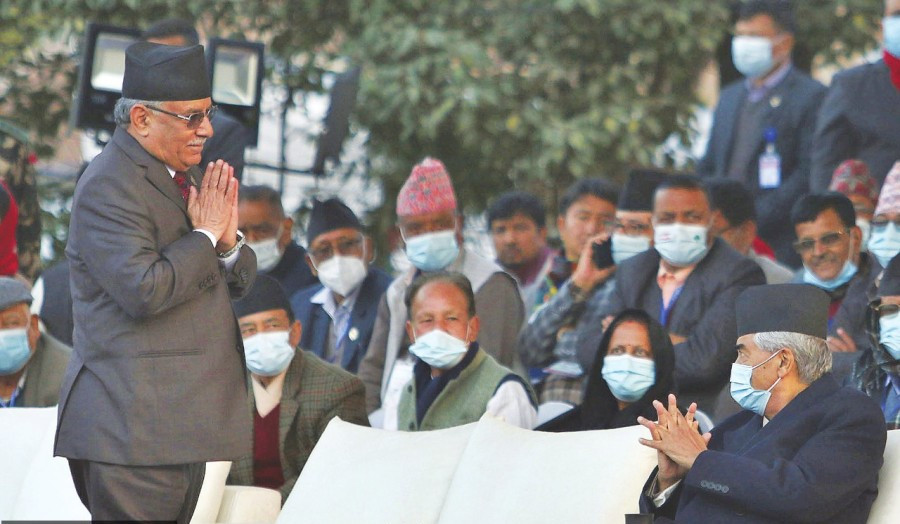Columns
Coalition for corruption
Power equations may change, but the unfair practices of the political syndicates perhaps won't.
Mohan Guragain
The traditional belief in the Nepali Congress has been that teaming up with the communist forces would ruin the country’s oldest democratic, or at least so called, force. The party’s founding leader, BP Koirala, is believed to have professed this idea. It took another founding party stalwart, Ganesh Man Singh, to put such fears behind and join forces with the left front Bam Morcha for the success of the 1990 uprising. Later in 2006, BP’s brother, Girija Prasad Koirala, teamed up with a few more communist parties, including the Maoist, to revolt against autocratic monarchy and eventually abolish it.
In nearly two decades since, the country’s largest party is markedly weakened in force and ideology. After its central leaders went to the grassroots level to gauge supporters’ mood, they found that the party was mired in internal disputes and misconceptions about the role of its top office-bearers, mainly the chief, Sher Bahadur Deuba.
Despite this erosion, what brings the Congress and the Maoist Centre together? Many say self-serving interests, mainly corruption, is the glue binding them. Leaders or financiers of the country’s top three forces—the Congress, the CPN-UML and the Maoist Centre—in the order of their strength in the federal parliament, are suspects in the major corruption cases being investigated. Three such scams making headlines for the past few months are the creation of fake Bhutanese refugees, gold smuggling through the Tribhuvan International Airport and the Lalita Niwas scam on the prime minister’s Baluwatar government compound.
Hand in glove
Some Congress and UML leaders are being investigated in the refugee case, links of some sitting ministers and Maoist leaders have been pointed to the gold smuggling racket, and two former prime ministers have been interrogated in the plotting and sale of the backyard land of the prime minister’s official residence.
These parties are desperate for power to spare the top leaders’ prosecution, directing and influencing the state mechanism for whom to investigate and whom to spare. Since the political mainstream onset in 2006, the former rebels, who waged the decade-long insurgency to topple the “oppressive” regime, have regularly been in power. A major fear of Maoist chief Pushpa Kamal Dahal is said to be possible investigation of the finances of the Maoist cantonments set up until the integration of the combatants in 2012. The government had released billions of rupees over the years for their upkeep. The Maoist leadership allegedly took a big cut of it, which has not been investigated.
Political movements related to criminal investigations have been used to threaten politicians of rival camps in Nepal. For instance, the Gaur killings of 2007 was highlighted recently after the government reached an agreement to look into the massacre allegedly blamed on the then party led by Madheshi leader Upendra Yadav. Yadav, who supports the incumbent Dahal-led government, was riled by the decision and mounted a protest. Lawmakers of the Madhav Kumar Nepal-led CPN (Unified Socialist) had spoken in Parliament that they would vote against the budget for the current fiscal year, leading to its failure. But the dormant Baluwatar files were opened, forcing the party to immediately reverse its decision and vote for the budget bill’s passage.
Politicians of the republican polity, who have been in dominant positions since nearly two decades prior, are engaged in survival tactics and eliminating opponents while the people live in perennial hardship.
A grim outlook
Corruption is sapping the country of its resources, holding back its progress. The 2022 Corruption Perceptions Index by Transparency International ranks Nepal 110th among 180 countries worldwide. With 34 points on a scale of zero to 100, Nepal was behind Bhutan, the Maldives, India and Sri Lanka as a country with “rampant corruption”. Based on the latest Multidimensional Poverty Index of the United Nations Development Programme, 5.13 million of the nearly 30 million Nepalis are poor, considering the 10 sub-sectors of deprivation in health, education and standard of living. The World Bank puts Nepal’s 2022 per capita gross development product at $1,336.5, India’s at 2,388.6 and China’s $12,720.2. Leaving the two immediate neighbours of Nepal (the world’s most populous countries) aside, Bhutan’s 2021 GDP per capita—another mountainous landlocked country close to us—was $3,266.4.
The Maoists, who sold the dreams of equality and prosperity to Nepal’s poor, are struggling to survive as a party. The fate of transitional justice remains crushed under the former rebels’ fears of prosecution for their war-era crimes, even as justice for conflict victims has been delayed or denied in principle. Maoist Supremo Dahal is seen skilful in playing not just one of his party comrades against another but a whole political party against the other, which is his thriving strategy in the competitive political scene. He has leaned on one party or the other to win elections even as his party’s popularity has been waning since becoming the largest party in 2008.
Backing up the Maoists has caused trouble for the Nepali Congress. The decision of the Congress brass to go to the federal and provincial elections last year in alliance with the Maoist Centre continues to haunt the country’s oldest party. The leadership of Nepal’s self-acclaimed democratic party faced fierce criticism from within for tying up with the radical leftist Maoist force, forgetting its principles and credentials of the past seven decades.
Partners in crime
Deuba’s love for his insurgency-era foe, Dahal, is surprisingly unflinching. Deuba stood rock solid against the tide of criticism from the whole party section that said fighting the elections with the Maoists in tow would erode the party’s support base in the long run and weaken its ideology. Leaders like Congress General Secretary Gagan Thapa still say the party messed up by supporting the faltering Maoists.
Deuba felt a stinging sense of defeat after the election results were out in December last year, when Dahal ditched the electoral alliance to join the UML camp to become the premier and when a faction in the Congress hesitated to catapult the leader of the third-largest party to the PM’s position. Only later did the Congress realise their loss as KP Sharma Oli and Dahal divvied up significant state positions. However, the Congress reclaimed power after painstakingly convincing Dahal, who had grown increasingly suspicious of Oli’s dominant ways, to support its leader Ramchandra Paudel in the presidential election. That put the Congress back on board.
Oli currently spits fire against the governing coalition, mainly composed of the Congress and the Maoists. Fear reigns over both ruling parties, whether one is plotting to ditch the ally and side with the UML to topple the government.
The dominant motive is profiting off state positions, power and dealings. Ruling party cadres are benefiting from government contracts at all levels. Corrupt businesses of the cronies of ruling parties are overlooked as long as they provide kickbacks. But the moment someone ceases to be the milking cow, the government mechanism may be used against them.
This political syndicate seems to last as long as the allies’ interests are served. Power equations may change, but parties’ unfair practices perhaps won’t. If the parties at the helm do not self-correct, a new tide may arise, sweeping them out of power.




 11.12°C Kathmandu
11.12°C Kathmandu















